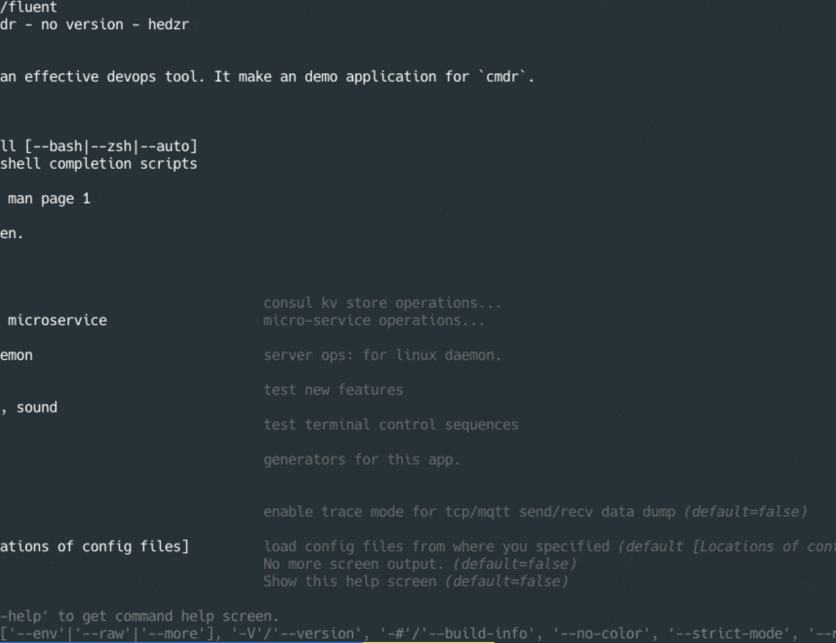Unstable v2: Working in progress, the main API might be stable till v2.1.0
cmdr is a POSIX-compliant, command-line argument parser library with Golang.
Since v2, our license moved to Apache 2.0.
See the image frames at #1.
There are many dirty codes in the cmdr.v1 which cannot be refactored as well. It prompted we reimplment a new one as v2.
The passing winter, we did rewrite the cmdr.v2 to keep it clean and absorbed in parsing and dispatching.
Some abilities were removed and relayouted to new modules.
That's why the Option Store has been split as a standalone module hedzr/store1.
A faster and colorful slog-like logger has been implemented freshly as hedzr/logg2.
hedzr/evendeep3 provides a deep fully-functional object copy tool. It helps to deep copy some internal objects easily. It is also ready for you.
hedzr/is4 is an environment detecting framework with many out-of-the-box detectors, such as is.InTesting and is.InDebugging.
Anyway, the whole supply chain painted:
graph BT
hzis(hedzr/is)-->hzlogg(hedzr/logg/slog)
hzis-->hzdiff(hedzr/evendeep)
hzlogg-->hzdiff
hzerrors(gopkg.in/hedzr/errors.v3)-->hzdiff
hzerrors-->hzstore(hedzr/store)
hzis-->hzstore(hedzr/store)
hzlogg-->hzstore(hedzr/store)
hzdiff-->hzstore(hedzr/store)
hzlogg-->cmdr(hedzr/cmdr/v2)
hzis-->cmdr
hzlogg-->cmdr
hzdiff-->cmdr
hzstore-->cmdr
v2 is in earlier state but the baseline is stable:
-
Basic command-line arguments parser like POSIX getopt and go stdlib flag.
-
Short flag, single character or a string here to support golang CLI style
- Compact flags if possible. Also the sticking value will be parsed. For example:
-c1b23zv=-c 1 -b 23 -z -v - Hit info:
-v -v -v=-v(hitCount == 3, hitTitle == 'v') - Optimized for slice:
-a 1,2,3 -a 4 -a 5,6=> []int{1,2,3,4,5,6} - Value can be sticked or not. Valid forms:
-c1,-c 1,-c=1and quoted:-c"1",-c'1',-c="1",-c='1', etc. - ...
- Compact flags if possible. Also the sticking value will be parsed. For example:
-
Long flags and aliases
-
Eventual subcommands: an
OnActionhandler can be attached. -
Eventual subcommands and flags: PreActions, PostAction, OnMatching, OnMatched, ...,
-
Auto bind to environment variables, For instance: command line
HELP=1 app=app --help. -
Builtin commands and flags:
--help,-h--version,-V--verbose.-v- ...
-
Help Screen: auto generate and print
-
Smart suggestions when wrong cmd or flag parsed. Jaro-winkler distance is used.
-
-
Loosely parse subcmds and flags:
- Subcommands and flags can be input in any order
- Lookup a flag along with subcommands tree for resolving the duplicated flags
-
Can integrate with hedzr/store1
- High-performance in-memory KV store for hierarchical data.
- Extract data to user-spec type with auto-converting
- Loadable external sources: environ, config files, consul, etcd, etc..
- extensible codecs and providers for loading from data sources
-
Three kinds of config files are searched and loaded via
loaders.NewConfigFileLoader():- Primary: main config, shipped with installable package.
- Secondary: 2ndry config. Wrapped by reseller(s).
- Alternative: user's local config, writeable. The runtime changeset will be written back to this file while app stopping.
-
TODO
- Shell autocompletion
- ...
More minor details need to be evaluated and reimplemented if it's still meaningful in v2.
Since v2.0.3, loaders had been splitted as a standalone repo so that we can keep cmdr v2 smaller and independer. See the relevant subproject cmdr-loaders.
v2 is staying in earlier state:
- Full list: CHANGELOG
A simple cli-app can be:
package main
// Simplest tiny app
import (
"context"
"io"
"os"
"gopkg.in/hedzr/errors.v3"
"github.com/hedzr/cmdr/v2"
"github.com/hedzr/cmdr/v2/cli"
"github.com/hedzr/cmdr/v2/pkg/dir"
logz "github.com/hedzr/logg/slog"
"github.com/hedzr/store"
)
func main() {
ctx := context.Background() // with cancel can be passed thru in your actions
app := prepareApp(
cmdr.WithStore(store.New()), // use an option store explicitly, or a dummy store by default
// cmdr.WithExternalLoaders(
// local.NewConfigFileLoader(), // import "github.com/hedzr/cmdr-loaders/local" to get in advanced external loading features
// local.NewEnvVarLoader(),
// ),
cmdr.WithTasksBeforeRun(func(ctx context.Context, cmd cli.Cmd, runner cli.Runner, extras ...any) (err error) {
logz.DebugContext(ctx, "command running...", "cmd", cmd, "runner", runner, "extras", extras)
return
}),
// true for debug in developing time, it'll disable onAction on each Cmd.
// for productive mode, comment this line.
// The envvars FORCE_DEFAULT_ACTION & FORCE_RUN can override this.
// cmdr.WithForceDefaultAction(true),
// cmdr.WithAutoEnvBindings(true),
)
if err := app.Run(ctx); err != nil {
logz.ErrorContext(ctx, "Application Error:", "err", err) // stacktrace if in debug mode/build
os.Exit(app.SuggestRetCode())
}
}
func prepareApp(opts ...cli.Opt) (app cli.App) {
app = cmdr.New(opts...).
Info("tiny-app", "0.3.1").
Author("The Example Authors") // .Description(``).Header(``).Footer(``)
// another way to disable `cmdr.WithForceDefaultAction(true)` is using
// env-var FORCE_RUN=1 (builtin already).
app.Flg("no-default").
Description("disable force default action").
// Group(cli.UnsortedGroup).
OnMatched(func(f *cli.Flag, position int, hitState *cli.MatchState) (err error) {
if b, ok := hitState.Value.(bool); ok {
// disable/enable the final state about 'force default action'
f.Set().Set("app.force-default-action", b)
}
return
}).
Build()
app.Cmd("jump").
Description("jump command").
Examples(`jump example`). // {{.AppName}}, {{.AppVersion}}, {{.DadCommands}}, {{.Commands}}, ...
Deprecated(`v1.1.0`).
// Group(cli.UnsortedGroup).
Hidden(false).
// Both With(cb) and Build() to end a building sequence
With(func(b cli.CommandBuilder) {
b.Cmd("to").
Description("to command").
Examples(``).
Deprecated(`v0.1.1`).
OnAction(func(ctx context.Context, cmd cli.Cmd, args []string) (err error) {
// cmd.Set() == cmdr.Store(), cmd.Store() == cmdr.Store()
cmd.Set().Set("app.demo.working", dir.GetCurrentDir())
println()
println(cmd.Set().WithPrefix("app.demo").MustString("working"))
cs := cmdr.Store().WithPrefix("jump.to")
if cs.MustBool("full") {
println()
println(cmd.Set().Dump())
}
cs2 := cmd.Store()
if cs2.MustBool("full") != cs.MustBool("full") {
logz.Panic("a bug found")
}
app.SetSuggestRetCode(1) // ret code must be in 0-255
return // handling command action here
}).
With(func(b cli.CommandBuilder) {
b.Flg("full", "f").
Default(false).
Description("full command").
Build()
})
})
app.Flg("dry-run", "n").
Default(false).
Description("run all but without committing").
Build()
app.Flg("wet-run", "w").
Default(false).
Description("run all but with committing").
Build() // no matter even if you're adding the duplicated one.
app.Cmd("wrong").
Description("a wrong command to return error for testing").
// cmdline `FORCE_RUN=1 go run ./tiny wrong -d 8s` to verify this command to see the returned application error.
OnAction(func(ctx context.Context, cmd cli.Cmd, args []string) (err error) {
dur := cmd.Store().MustDuration("duration")
println("the duration is:", dur.String())
ec := errors.New()
defer ec.Defer(&err) // store the collected errors in native err and return it
ec.Attach(io.ErrClosedPipe, errors.New("something's wrong"), os.ErrPermission)
// see the application error by running `go run ./tiny/tiny/main.go wrong`.
return
}).
With(func(b cli.CommandBuilder) {
b.Flg("duration", "d").
Default("5s").
Description("a duration var").
Build()
})
return
}More examples please go to cmdr-tests/examples.
Thanks to JetBrains for donating product licenses to help develop cmdr
Since v2, our license moved to Apache 2.0.
The v1 keeps under MIT itself.




